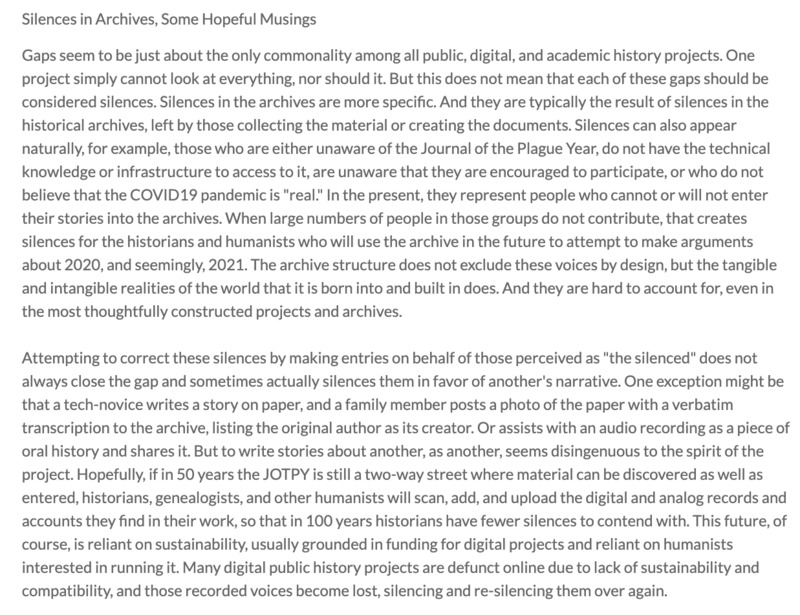Item
Silences in Archives, Some Hopeful Musings
Title (Dublin Core)
Silences in Archives, Some Hopeful Musings
Description (Dublin Core)
Gaps seem to be just about the only commonality among all public, digital, and academic history projects. One project simply cannot look at everything, nor should it. But this does not mean that each of these gaps should be considered silences. Silences in the archives are more specific. And they are typically the result of silences in the historical archives, left by those collecting the material or creating the documents. Silences can also appear naturally, for example, those who are either unaware of the Journal of the Plague Year, do not have the technical knowledge or infrastructure to access to it, are unaware that they are encouraged to participate, or who do not believe that the COVID19 pandemic is "real." In the present, they represent people who cannot or will not enter their stories into the archives. When large numbers of people in those groups do not contribute, that creates silences for the historians and humanists who will use the archive in the future to attempt to make arguments about 2020, and seemingly, 2021. The archive structure does not exclude these voices by design, but the tangible and intangible realities of the world that it is born into and built in does. And they are hard to account for, even in the most thoughtfully constructed projects and archives.
Attempting to correct these silences by making entries on behalf of those perceived as "the silenced" does not always close the gap and sometimes actually silences them in favor of another's narrative. One exception might be that a tech-novice writes a story on paper, and a family member posts a photo of the paper with a verbatim transcription to the archive, listing the original author as its creator. Or assists with an audio recording as a piece of oral history and shares it. But to write stories about another, as another, seems disingenuous to the spirit of the project. Hopefully, if in 50 years the JOTPY is still a two-way street where material can be discovered as well as entered, historians, genealogists, and other humanists will scan, add, and upload the digital and analog records and accounts they find in their work, so that in 100 years historians have fewer silences to contend with. This future, of course, is reliant on sustainability, usually grounded in funding for digital projects and reliant on humanists interested in running it. Many digital public history projects are defunct online due to lack of sustainability and compatibility, and those recorded voices become lost, silencing and re-silencing them over again.
Attempting to correct these silences by making entries on behalf of those perceived as "the silenced" does not always close the gap and sometimes actually silences them in favor of another's narrative. One exception might be that a tech-novice writes a story on paper, and a family member posts a photo of the paper with a verbatim transcription to the archive, listing the original author as its creator. Or assists with an audio recording as a piece of oral history and shares it. But to write stories about another, as another, seems disingenuous to the spirit of the project. Hopefully, if in 50 years the JOTPY is still a two-way street where material can be discovered as well as entered, historians, genealogists, and other humanists will scan, add, and upload the digital and analog records and accounts they find in their work, so that in 100 years historians have fewer silences to contend with. This future, of course, is reliant on sustainability, usually grounded in funding for digital projects and reliant on humanists interested in running it. Many digital public history projects are defunct online due to lack of sustainability and compatibility, and those recorded voices become lost, silencing and re-silencing them over again.
Date (Dublin Core)
Creator (Dublin Core)
Contributor (Dublin Core)
Event Identifier (Dublin Core)
Partner (Dublin Core)
Type (Dublin Core)
text story
Controlled Vocabulary (Dublin Core)
English
Museums & Libraries
English
Technology
Curator's Tags (Omeka Classic)
Contributor's Tags (a true folksonomy) (Friend of a Friend)
Date Submitted (Dublin Core)
02/02/2021
Date Modified (Dublin Core)
02/07/2021
11/28/2021
This item was submitted on February 2, 2021 by Erica Price using the form “Share Your Story” on the site “A Journal of the Plague Year”: https://covid-19archive.org/s/archive
Click here to view the collected data.
